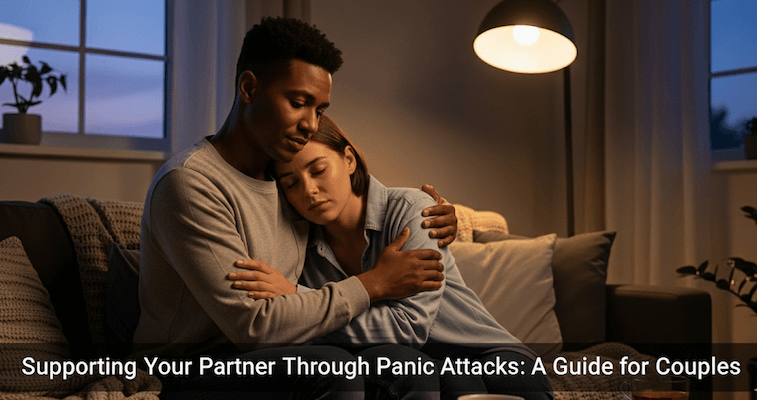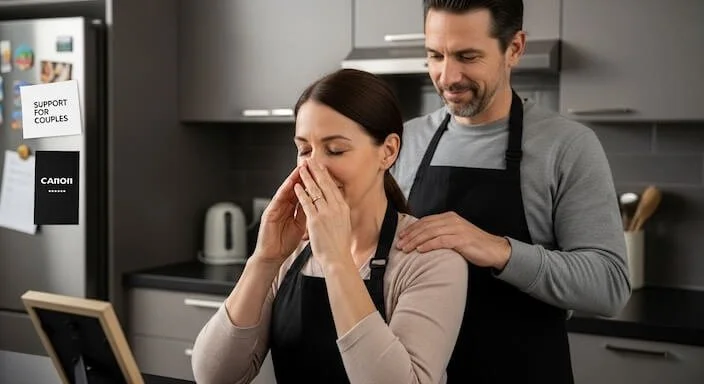Supporting Your Partner Through Panic Attacks: A Guide for Couples
Panic attacks hit without warning and leave people frozen by fear. The symptoms are so intense that about 2 to 3 percent of adults experience recurring episodes each year, and women are more likely to be affected than men. Most people think panic attacks are just a mental battle, but the real shock is how much they hijack both the body and relationships at the same time.
Quick Summary
| Takeaway | Explanation |
|---|---|
| Panic attacks feel uncontrollable. | They are intense episodes of fear or anxiety, often mimicking physical threats without actual danger. |
| Physical symptoms can be severe. | Common symptoms include rapid heart rate, sweating, and dizziness, leading to significant distress. |
| Anticipatory anxiety compounds fear. | Repeated attacks can cause persistent fear of future episodes, affecting daily life and behaviors. |
| Supportive communication is essential. | Partners should create shared language and routines to help each other feel secure during attacks. |
| Recognizing triggers aids management. | Identifying personal triggers allows for better coping strategies and reduces the unpredictability of panic attacks. |
What Are Panic Attacks? Defining the Experience
Panic attacks are sudden, intense episodes of overwhelming fear or anxiety that strike without warning, often creating a profound sense of terror and physical distress. These experiences can feel like a tsunami of emotional and physiological responses that completely hijack an individual's sense of control and safety.
Understanding the Physiological Response
When a panic attack occurs, the body's natural "fight or flight" response activates dramatically, even when no actual physical threat exists. According to National Institute of Mental Health, this neurological response triggers a cascade of intense physical symptoms that can feel terrifyingly real:
Rapid heart rate and chest pain
Intense sweating
Trembling or shaking
Shortness of breath
Feelings of choking
Extreme dizziness
Psychological Dimensions of Panic Attacks
Beyond the physical manifestations, panic attacks carry significant psychological weight. They often produce profound feelings of detachment, where individuals feel disconnected from reality or fear they are losing control. Many people describe these experiences as feeling like they might be dying or going crazy, which intensifies the overall emotional trauma.
These episodes typically peak within 10 minutes but can feel like an eternity for those experiencing them. Learn more about managing anxiety symptoms with professional support.
Understanding panic attacks is crucial for couples navigating these challenging experiences together. Recognizing that these are legitimate medical responses, not personal weaknesses, can help partners provide compassionate support and seek appropriate professional guidance.
Why Panic Attacks Matter: The Emotional and Physical Impact
Panic attacks are far more than momentary experiences of fear. They represent profound disruptions that can dramatically reshape an individual's psychological landscape and interpersonal relationships, creating intricate challenges that extend well beyond the immediate episode.
Long Term Psychological Consequences
Repeated panic attacks can trigger a cascading effect of psychological vulnerabilities. According to Anxiety and Depression Association of America, individuals experiencing chronic panic attacks often develop anticipatory anxiety - a persistent fear of experiencing another attack. This mental state can lead to significant behavioral changes:
Avoiding social situations
Restricting personal movement and experiences
Developing heightened sensitivity to physical sensations
Experiencing reduced confidence in personal capabilities
Physical Health Implications
The physiological stress generated by panic attacks extends far beyond momentary discomfort. Continuous activation of the body's stress response can potentially compromise cardiovascular and immune system functioning. Chronic panic attacks may increase risks of developing:
Elevated blood pressure
Weakened immune response
Increased inflammation markers
Potential heart rhythm irregularities
Learn more about effective treatment approaches for managing panic symptoms.
For couples navigating these challenges, understanding the comprehensive impact of panic attacks becomes crucial. Recognizing these experiences as legitimate medical conditions requiring compassionate support can transform how partners approach healing and resilience together.
Here is a table summarizing the key psychological and physical impacts of panic attacks, as discussed in the article.
| Impact Type | Specific Effects |
|---|---|
| Psychological | Anticipatory anxiety, social avoidance, reduced confidence, detachment from reality, fear of losing control |
| Physical | Rapid heart rate, chest pain, sweating, dizziness, shortness of breath, potential cardiovascular and immune issues |
| Long-Term Effects | Persistent behavioral changes, restricted movement, increased risk of health problems, heightened sensitivity to sensations |
How Panic Attacks Work: The Science Behind the Symptoms
Panic attacks are complex neurological events where the brain's threat detection system becomes dramatically overactivated, triggering an intense physiological response that feels overwhelmingly real and dangerous, even when no actual threat exists.
Neurological Trigger Mechanisms
At the core of panic attacks is the amygdala, a small almond-shaped region in the brain responsible for processing emotional responses. According to Frontiers in Psychiatry, this neural center initiates rapid emergency responses by:
Flooding the body with stress hormones like cortisol and adrenaline
Activating the sympathetic nervous system
Preparing the body for an immediate fight or flight response
Bypassing rational cognitive processing
Physiological Cascade of Responses
When the amygdala signals a perceived threat, the body enters a state of heightened alert. This triggers a complex chain of neurochemical and hormonal reactions that produce the intense physical symptoms associated with panic attacks. Neurotransmitters like norepinephrine and glutamate surge, causing:
Accelerated heart rate
Rapid breathing
Increased muscle tension
Heightened sensory awareness
Suppression of non-essential bodily functions
Discover effective strategies for managing anxiety symptomsand understanding your body's unique stress response.
Understanding these intricate neurological processes helps couples recognize that panic attacks are not a sign of weakness, but a complex interplay of brain chemistry and stress responses that can be managed with professional support and compassionate understanding.
Key Concepts of Panic Attacks: Triggers, Frequency, and Recovery
Panic attacks are not random occurrences but complex psychological events with identifiable patterns, triggers, and potential pathways to management. Understanding these key elements can empower individuals and couples to approach panic attacks with knowledge and compassion.
Identifying Common Triggers
Panic attacks often emerge from specific psychological and environmental catalysts. According to National Institute of Mental Health, common triggers include:
Significant life transitions or stressors
Chronic underlying anxiety disorders
Traumatic past experiences
Genetic predispositions
Substantial changes in physical health
Excessive caffeine or substance use
Understanding Frequency and Patterns
The occurrence of panic attacks varies dramatically between individuals. Some people experience isolated incidents, while others might encounter multiple episodes monthly. Research indicates that approximately 2-3% of adults experience recurring panic attacks, with women statistically more likely to be affected. The unpredictability of these episodes can create significant emotional strain for both the individual experiencing them and their partner.
This table organizes the most common triggers for panic attacks, making it easier for readers to identify possible sources described in the article.
| Trigger Category | Examples Mentioned in the Article |
|---|---|
| Life Transitions/Stressors | Moves, career changes, major life events |
| Mental Health Conditions | Chronic anxiety disorders |
| Traumatic Experiences | Past trauma |
| Genetic Factors | Family history of panic attacks |
| Physical Health Changes | Sudden illness or health fluctuations |
| Substance Use | Excessive caffeine or drug/alcohol intake |
Learn about specialized treatment approaches for managing panic symptoms that can help restore a sense of control and predictability.
Recovery is not about eliminating panic attacks entirely but developing robust coping mechanisms and understanding individual triggers. For couples navigating this challenge, creating a supportive, non-judgmental environment becomes crucial in managing these intense psychological experiences.
Navigating Panic Attacks Together: Support for Couples
Panic attacks can create significant emotional strain within relationships, transforming what should be a supportive partnership into a complex navigation of vulnerability, understanding, and mutual healing. Recognizing panic attacks as a shared challenge rather than an individual burden is the first step toward collective resilience.
Creating a Supportive Environment
According to National Institute of Mental Health, supporting a partner experiencing panic attacks requires compassionate and strategic approaches. Effective support involves:
Listening without judgment
Validating emotional experiences
Learning individual panic attack triggers
Remaining calm during episodes
Avoiding minimizing or dismissing symptoms
Encouraging professional mental health support
Communicating Through Panic Attacks
Effective communication becomes crucial when one partner experiences recurring panic attacks. Developing a shared language around these experiences helps reduce isolation and builds mutual understanding. This might involve creating subtle signals, establishing safety protocols, or developing personalized comfort strategies that help the experiencing partner feel secure and supported.
Explore our specialized counseling strategies for couples managing anxiety and learn techniques to strengthen your relationship during challenging times.
Ultimately, navigating panic attacks together is about partnership, patience, and collective growth. By approaching these experiences with empathy, education, and a commitment to mutual healing, couples can transform potential relationship challenges into opportunities for deeper connection and understanding.
Find Relief and Reconnection as a Couple in Colorado
Are panic attacks taking a toll on your relationship, leaving you and your partner feeling overwhelmed or disconnected? If you have recognized the intense emotional strain and psychological impact described in this article, you are not alone. Couples facing the unpredictability of panic attacks often struggle with communication, understanding, and finding a sense of safety together. At South Denver Therapy, our caring team offers proven solutions designed specifically for couples navigating anxiety, panic attacks, and related challenges.
Take the first step toward healing and resilience as a team. Discover how South Denver Therapy can help you with personalized Couples Counseling and specialized EMDR Therapy for anxiety and panic. We offer both in-person support in Castle Rock and virtual appointments across Colorado, making it easier than ever to get started. Book your session today to regain control, restore connection, and build a stronger partnership—because your relationship deserves compassionate care right now.
Frequently Asked Questions
What are panic attacks?
Panic attacks are sudden episodes of overwhelming fear or anxiety that come without warning, often leading to intense emotional and physiological symptoms like rapid heart rate, shortness of breath, and feelings of terror.
What are common triggers for panic attacks?
Common triggers include significant life transitions, chronic anxiety disorders, traumatic experiences, genetic predispositions, changes in physical health, and excessive caffeine or substance use.
How can couples support each other during panic attacks?
Couples can support each other by listening without judgment, validating feelings, learning triggers, remaining calm during episodes, and encouraging professional mental health support.
What is the relationship between panic attacks and long-term health?
Repeated panic attacks can lead to anticipatory anxiety, impacting social interactions and confidence. Additionally, chronic stress from these episodes can affect cardiovascular health and immune response.



